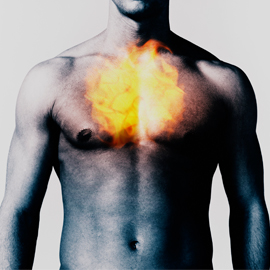Acid Reflux and GERD
 Acid reflux and heartburn occur when digestive juices from the stomach backwash into the esophagus, causing inflammation and irritation. When acid reflux or heartburn becomes chronic, it may be gastroesophageal reflux disease (GERD).
Acid reflux and heartburn occur when digestive juices from the stomach backwash into the esophagus, causing inflammation and irritation. When acid reflux or heartburn becomes chronic, it may be gastroesophageal reflux disease (GERD).
Obesity increases your risk of developing acid reflux and heartburn. Many people find at least partial relief from acid reflux and heartburn following LAP-BAND surgery. Dr. Bagnato also offers surgical treatment for gastroesophageal reflux disease.
What is Gastroesophageal Reflux Disease?
Gastroesophageal reflux disease occurs when the valve separating the stomach from the esophagus becomes damaged. This valve is called the lower esophageal sphincter (LES). When it becomes damaged it is unable to close properly, allowing digestive juices from the stomach to flow upwards where they can irritate the tissues lining the esophagus.
Symptoms of GERD include:
- Heartburn
- Acid reflux
- Indigestion
- Nausea
- Dry cough
- Asthma-like symptoms
- Difficulty swallowing
Acid reflux and heartburn that develop more than two times each week may be an indication of GERD.
Treatment for Acid Reflux Disease
Being obese or overweight is strongly linked with a higher risk for gastroesophageal reflux disease. Losing weight won’t necessarily cure gastroesophageal reflux disease, but it can significantly reduce the frequency and severity of GERD symptoms.
Along with weight loss, there are several other lifestyle changes that can alleviate GERD symptoms. The biggest of these factors is changing your diet. Eating smaller portions, not eating before lying down and avoiding common trigger foods can all help to minimize symptoms.
Common heartburn trigger foods include:
- Spicy foods
- Fatty foods
- Highly acidic foods, like citrus and tomatoes
- Alcohol
- Peppermint
Acid reflux may sometimes be treated with medications, including over-the-counter antacids and prescription strength H-2 receptor blockers and proton pump inhibitors (PPIs), which stifle acid production in the stomach. These medications will not correct GERD, but can alleviate symptoms temporarily.
Surgical procedures can also be used to treat acid reflux:
- Nissen fundoplication tightens the lower esophageal sphincter by wrapping the top of the stomach around the weakened valve, thus reinforcing it and preventing the backwash of stomach acid.
- EsophyX surgery is an incisionless procedure that folds tissue at the top of the stomach to reinforce the lower esophageal sphincter, thus preventing further reflux.
In certain situations, GERD can be treated through the surgical correction of a hiatal hernia, in which the stomach pushes through a weakened section of the diaphragm. If a hiatal hernia is present, correcting it will often result in reduced acid reflux and heartburn.